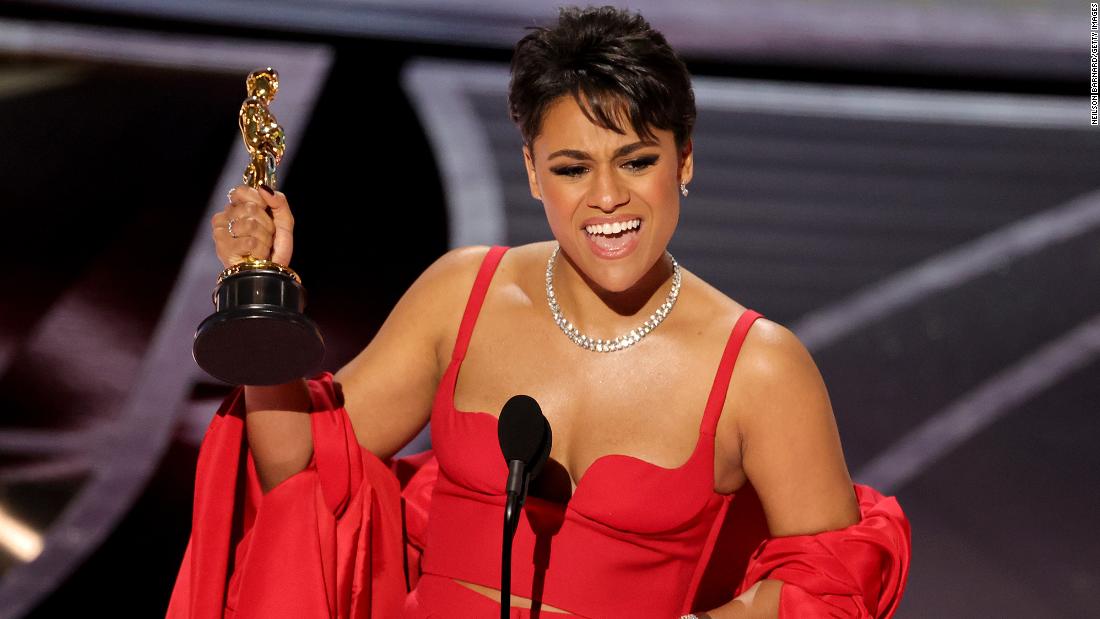
Opinion: This year’s Oscars was more than the one where Will Smith got into it with Chris Rock
An ebullient Ariana DeBose took to the stage of the Dolby Theatre in Hollywood on Sunday night, after Daniel Kaluuya announced her as winner of the Academy Award for best supporting actress for her role as Anita in Steven Spielberg’s reimagining of “West Side Story.” “Now you see why Anita says, ‘I want to be in America,'” DeBose said, “because even in this weary world that we live in, dreams do come true, and that’s really a heartening thing right now.” DeBose had already collected a BAFTA Award, Critics Choice Award, SAG Award and Golden Globe Award for her portrayal of Anita, the girlfriend of Sharks gang leader Bernardo.
Even in 2022, when “inclusion” and “diversity” are buzzwords in the entertainment industry, Latinos are rarely seen in lead roles in major films. Although Latinos are 18.7% of the US population, the latest UCLA Diversity Study reports that Latinos “remain extremely underrepresented” in all major film categories. In 2021, Latinos were just 7.1% of film leads, 7.7% of overall cast members and 5.6% of writers. So, DeBose’s win was a genuine triumph over the odds.
DeBose is also the first openly queer woman of color to win best supporting actress. As the National Hispanic Media Coalition has pointed out, she is also the first Afro-Latino performer ever to receive an Oscar nomination.
This is significant, as about a quarter of US Hispanics identify as Black and Latino, according to the Pew Research Center. But if Latinos struggle to be accepted in Hollywood, Afro-Latinos are virtually invisible in the entertainment industry. In a business that tends to reinforce stereotypes, Afro-Latinos are often seen as neither fully Black nor fully Latino. The result is that, on film and on TV, it’s as if Afro-Latinos don’t exist. Consider that the 2021 film version of “In the Heights,” set in a predominantly Dominican community in New York City, failed to include Afro-Latinos in major roles, leading to accusations of colorism and later an apology from writer Lin-Manuel Miranda.
From the Oscar stage, DeBose described herself as “a queer, openly queer woman of color, an Afro-Latina who found her strength in life through art.” She promised “anybody who has ever questioned your identity … that there is indeed a place for us.” How refreshing it was to see her embrace her full identity. DeBose is visible proof that Latinos come in all colors, and her newfound stardom may help chip away at the homophobia and colorism that persist within the Latino community.
Later, introducing a performance of “We Don’t Talk About Bruno” from “Encanto,” presenter John Leguizamo declared, “We’ve got great representation here tonight, people.” He was right. Sebastián Yatra’s heartfelt performance of “Dos Oruguitas” (“Two Caterpillars”) from “Encanto” was lovely. The song’s story of families pulled apart by the larger world can be seen as relevant to everyone, from the migrants at America’s border to the thousands of people displaced by the Russian invasion of Ukraine.
If Miranda missed out on a chance to achieve Emmy Grammy Oscar Tony (EGOT) status with his work on “Encanto” — the award for best original song went to “No Time to Die” — the performance of “We Don’t Talk About Bruno” was a glimpse of the film’s homage to Colombian culture. Yvett Merino, who is Latina, was part of the winning “Encanto” team for best animated feature. In her acceptance, Merino said she was proud to work on a film that “put beautiful, diverse characters front and center.”
Other prominent Latino nominees included Penelope Cruz (best actress) and her husband, Javier Bardem (best actor), both from Spain.
Sure, Hollywood has a long way to go when it comes to fully including and depicting Latinos, and the Academy Awards are only one night. Yet this was an evening that gave Latino performers center stage before a global audience. Instead of the usual stereotypes, viewers saw Latino achievers who represent the best of our communities.
Sixty years ago, Rita Moreno made history as the first Latina to win an Oscar, for the original “West Side Story.” Now, Sunday night’s Latino winners and nominees are poised to inspire a new generation of artists — and that is truly cause for celebration.
